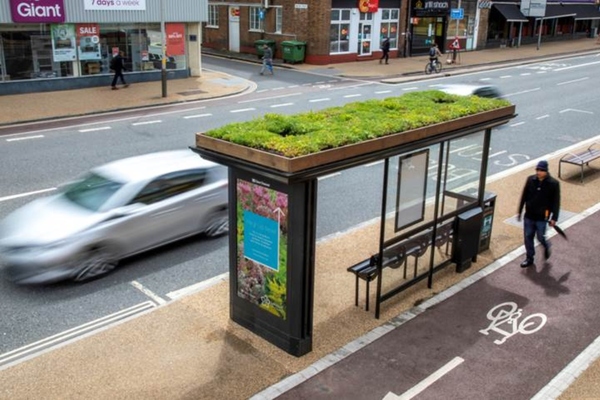
Photo: Clear Channel
Leicester installs bee-friendly bus stops
28 June 2021
by Christopher Carey
The UK city of Leicester is installing 30 ‘living’ bus shelter roofs as part of a new programme to revamp its infrastructure while supporting the environment.
Working with advertising firm Clear Channel, the so-called ‘bee bus stops’ will be planted with a mix of wildflowers to attract pollinating insects and add extra greenery to the city.
The City Council says the shelters will positively contribute towards biodiversity and climate resilience, absorb rainwater falling on the roof, and help to reduce the ‘urban heat island’ effect by capturing harmful particulates from the air.
Living roofs
Deputy City Mayor Cllr Adam Clarke, Environment and Transportation Lead, said: “This is just one of many benefits of the citywide revamp of our bus shelters.
“The new, modern shelters will be great for passengers and the mix of solar power and living roofs is another step forward for our ambition to be a carbon neutral, biodiverse and climate-adapted city by 2030.”
The council is also fitting bus stops with solar panels and smart lighting – where feasible – to cut energy use.
Installation of the living roofs is part of a ten-year contract with Clear Channel, and the firm will absorb the cost as part of a multi-million-pound investment overhauling the city’s 479 bus shelters.
Work on the 30 roofs is expected to be completed by summer, and a full revamp of all of the city’s bus stops is planned to be delivered by late 2022.
Will Ramage, Clear Channel’s Managing Director, said: “We know that true change comes when we start to roll out these types of innovation at scale.
“We’d love to see the living roofs in every town and city across the UK and Europe, having a tangible and positive effect on our planet.”
Several European cites, including Utrecht, have undertaken similar initiatives, with the Dutch city transforming 316 bus stops with living roofs in 2019.
Bee Roads
The new bus stops are part of Leicester’s ongoing ‘Bee Roads‘ programme, which to date has seen over 5.5 kilometres of roadside and roundabouts across the city planted with wildflowers to help make the city a haven for pollinators.
The project started in 2017 as a partnership between the council and the environmental charity Buglife.
In March, the charity launched its interactive B-lines tool, which is committed to increasing the number of ‘insect superhighways’ running through the UK’s cities and towns.
Image: Clear Channel







